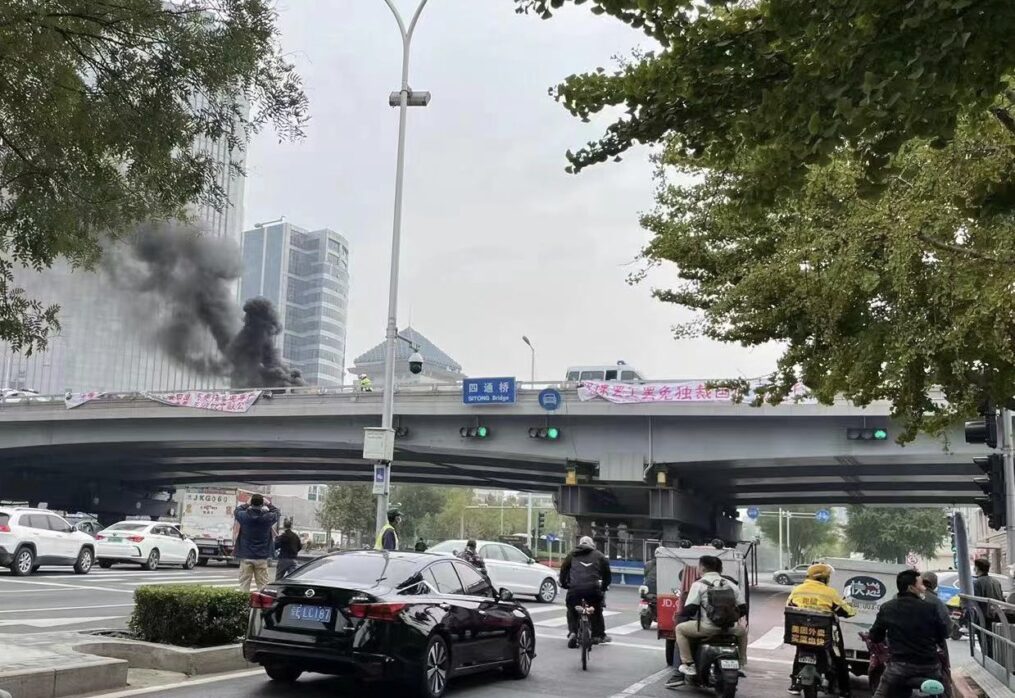A rare protest banner hangs off a bridge in Beijing
A rare act of defiance criticizing President Xí Jìnpíng 习近平 and China’s COVID-zero policy took place in Beijing, just days before the major Communist Party political reshuffle that begins on Sunday.
Images widely circulated on social media on Thursday showed two protest banners hanging off Sitong Bridge in Haidian District in Beijing near the prestigious Renmin University, while a plume of smoke from an unknown source rose nearby (see videos here and here). Scrawled in red lettering, the protest banner reads:
We don’t want COVID tests. We want to eat.
We don’t want Cultural Revolution. We want reforms.
We don’t want lockdowns. We want freedom.
We don’t want leaders. We want votes.
We don’t want lies. We want dignity.
We aren’t slaves. We are citizens.
不要核酸要吃饭,不要文革要改革
不要封城要自由,不要领袖要选票
不要谎言要尊严,不做奴才做公民
Go on strike. Remove dictator and national traitor Xi Jinping.
罢课罢工罢免獨裁国贼习近平
The act of dissent is extraordinary given how rare political protests are in China, and given that Beijing’s security arm has also been on high alert leading up to the major 20th Party Congress that begins in the city on Sunday. But it is highly unlikely to lead to further unrest or acts of dissidence:
- Criticisms or viewpoints about Xi or the Communist Party that don’t align with state-run media are censored, not publicized.
- Extra security personnel have been deployed from October 6 to 23, according to procurement tenders per Reuters.
- “China’s political stability is solid, because the country is developing very well in general, and the vast majority of people support the CPC’s leadership,” the former editor-in-chief of the nationalist tabloid Global Times Hú Xījìn 胡锡进 wrote on Twitter, expressing a common viewpoint.
“If you weren’t at that bridge, you’re not talking about it or seeing it — unless you have Twitter,” said Anthony Tao, the managing editor of The China Project, who is based in the Chinese capital. Twitter is, of course, blocked in China without circumvention tools, and Chinese internet regulators were quick to censor any trace of the protest on local social media platforms such as Weibo immediately after the incident, including mentions about Beijing, Haidian, and Sitong Bridge.
- Some subtle messages of support for the protester have appeared on Weibo: “Moved by this individual heroism, wish this land of ours doesn’t betray his expectations, and pray for his safety,” wrote one user.
- The police presence grew more prominent around the intersection after the banners had been removed in the afternoon, per reports from the Wall Street Journal and Reuters.
- “Usually during the run-up to high-profile events, whether national congresses or international meetings or the Olympics, you’ll notice increased police presence on overpasses and major intersections. If there aren’t cops guarding that bridge tomorrow, I’d be shocked,” Tao said.
China news, weekly.
Sign up for The China Project’s weekly newsletter, our free roundup of the most important China stories.
Meanwhile, more COVID-zero curbs are being rolled out in Shanghai and other major cities to control a surge in cases, much to the frustration and agitation of some people in China who have been in and out of lockdowns since the start of the pandemic.
- Health Code pop-up windows, which notify people that they might be a COVID risk, have drawn ire and fear among residents.
- Liáng Wànnián 梁万年, the head of the National Health Commission’s COVID-19 response expert panel, said today that it was “necessary” for China to stick with its COVID-zero policy — the first official response to the widespread speculation that Beijing may ease restrictions at the Party Congress.

